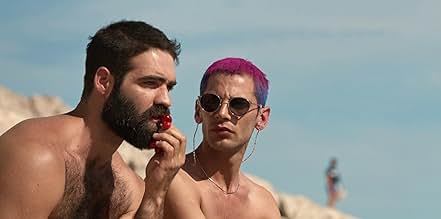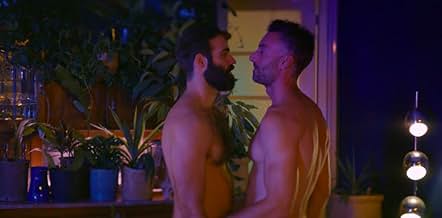CALIFICACIÓN DE IMDb
6.7/10
1.5 k
TU CALIFICACIÓN
Mientras se bañan durante todo el día en la playa queer de Atenas, los mejores amigos Demos y Nikitas rememoran los acontecimientos de un verano reciente con la perspectiva de convertirlos e... Leer todoMientras se bañan durante todo el día en la playa queer de Atenas, los mejores amigos Demos y Nikitas rememoran los acontecimientos de un verano reciente con la perspectiva de convertirlos en un guión para la ópera prima de Nikitas.Mientras se bañan durante todo el día en la playa queer de Atenas, los mejores amigos Demos y Nikitas rememoran los acontecimientos de un verano reciente con la perspectiva de convertirlos en un guión para la ópera prima de Nikitas.
- Dirección
- Guionistas
- Elenco
- Premios
- 4 premios ganados y 16 nominaciones en total
- Dirección
- Guionistas
- Todo el elenco y el equipo
- Producción, taquilla y más en IMDbPro
Opiniones destacadas
When Robert Rosson and Robert Parrish had way too much footage to work with editing the (eventual) Oscar-winning ALL THE KING'S MEN, they hit upon the idea of finding the central moment of each scene, then cutting out everything that wasn't 100 feet before or after that moment.
The creative team for this movie should have done something similar. There's way too much establishing and throat-clearing at the beginning of every scene, and way too much resolution and tying up loose ends at the finish of every scene.
When you add to this that the characters aren't developed so there's no one to care for, the movie becomes a big bore. I was disappointed. The only thing that kept me watching was the possibility of more on-screen nudity.
The creative team for this movie should have done something similar. There's way too much establishing and throat-clearing at the beginning of every scene, and way too much resolution and tying up loose ends at the finish of every scene.
When you add to this that the characters aren't developed so there's no one to care for, the movie becomes a big bore. I was disappointed. The only thing that kept me watching was the possibility of more on-screen nudity.
The storyline isn't terrible, but it's evident that the film's primary target audience is the Greek community. The lead actor's frequent nudity seems calculated to draw in viewers and generate buzz, but in my opinion, it detracts from the overall authenticity of the film. Tsiantoulas's performance is inconsistent, indicating a lack of effective direction from the filmmaker, which might have better served to guide him to a more convincing portrayal. Additionally, the film straddles the line between comedy and drama without fully committing to either genre. In summary, while it's worth a watch, particularly for a Greek audience, it's best to approach it with tempered expectations.
When I started watching this movie, I thought, "An ordinary audience will probably think the film includes too much nudity." When I read the reviews, I realized I was right. However, this film doesn't actually contain excessive nudity. Instead, it portrays an aspect of gay culture. One of the most misguided judgments originating from a heterosexual mindset has always been the attempt to equate gay culture with heterosexual culture.
Yes, gays demand to be treated equally in society regarding rights and freedoms, and they are absolutely justified in this demand. The modern world has started to pave the way for equality, although there is still a long road ahead to achieve complete equality and freedom. However, we must understand that gay culture cannot be reduced to just a relationship between two people of the same sex. It is a broader concept that includes unique elements.
In gay culture, the way social life is lived may share similarities with heterosexuality, but the lifestyle demonstrates notable differences. For example, open relationships, orgies, and group dynamics are more widely accepted within gay culture than in heterosexual culture. Sexuality, rather than just sex, is a defining feature of gay culture and plays a crucial role in shaping identity.
Returning to the movie: yes, it features nudity, but this serves as a colorful element that adds cheerfulness and reminds viewers that the film stems from gay culture.
As for the movie itself, I liked it very much. Above all, experiencing Greece during the summertime made me feel wonderful. The actors-Yorgos Tsiantoulas (Demosthenes), Andreas Labropoulos (Nikitas), Nikolaos Mihas (Panos), Roubini Vasilakopoulou (Keti), Vasilis Tsigristaris (Thymios), and others-deliver outstanding performances. Their acting convinces us that they are as real as we are. The dialogues between the characters are relatable and innocent.
While the movie avoids diving deeply into melancholy, it provides a strong depiction of the characters' past experiences. The film's greatest success lies in its technique. The script and direction employ an innovative storytelling method. Flashbacks, typewritten notes, and structuring the film as a discussion of a movie scenario are completely fresh elements. For this, the director, Zacharias Mavroeidis (also the scriptwriter), and Fondas Chalatsis, the co-scriptwriter, deserve congratulations.
If you are a heterosexual viewer and find gay nudity disturbing, consider how many heterosexual nude scenes a gay audience sees in mainstream movies. Gay individuals endure many such scenes-not only in movies but also in commercials, magazines, TV shows, billboards, and daily life. Try to view it from their perspective.
Yes, gays demand to be treated equally in society regarding rights and freedoms, and they are absolutely justified in this demand. The modern world has started to pave the way for equality, although there is still a long road ahead to achieve complete equality and freedom. However, we must understand that gay culture cannot be reduced to just a relationship between two people of the same sex. It is a broader concept that includes unique elements.
In gay culture, the way social life is lived may share similarities with heterosexuality, but the lifestyle demonstrates notable differences. For example, open relationships, orgies, and group dynamics are more widely accepted within gay culture than in heterosexual culture. Sexuality, rather than just sex, is a defining feature of gay culture and plays a crucial role in shaping identity.
Returning to the movie: yes, it features nudity, but this serves as a colorful element that adds cheerfulness and reminds viewers that the film stems from gay culture.
As for the movie itself, I liked it very much. Above all, experiencing Greece during the summertime made me feel wonderful. The actors-Yorgos Tsiantoulas (Demosthenes), Andreas Labropoulos (Nikitas), Nikolaos Mihas (Panos), Roubini Vasilakopoulou (Keti), Vasilis Tsigristaris (Thymios), and others-deliver outstanding performances. Their acting convinces us that they are as real as we are. The dialogues between the characters are relatable and innocent.
While the movie avoids diving deeply into melancholy, it provides a strong depiction of the characters' past experiences. The film's greatest success lies in its technique. The script and direction employ an innovative storytelling method. Flashbacks, typewritten notes, and structuring the film as a discussion of a movie scenario are completely fresh elements. For this, the director, Zacharias Mavroeidis (also the scriptwriter), and Fondas Chalatsis, the co-scriptwriter, deserve congratulations.
If you are a heterosexual viewer and find gay nudity disturbing, consider how many heterosexual nude scenes a gay audience sees in mainstream movies. Gay individuals endure many such scenes-not only in movies but also in commercials, magazines, TV shows, billboards, and daily life. Try to view it from their perspective.
The movie-within-a-movie narrative is a popular cinematic storytelling approach, but, to my knowledge, writer-director Zacharias Mavroeidis's fourth feature outing is the first film to make use of it in the LGBTQ+ genre. This endearing gay comedy-drama tells the story of two long-time best friends, Demosthenes (Yorgos Tsiantoulas), a former actor-turned civil servant, and Nikitas (Andreas Labropoulos), a former actor-turned aspiring filmmaker, who try to come up with a concept for the would-be auteur's latest movie project while hanging out together at a nude beach on the stunningly beautiful Greek seacoast. They toss around a variety of ideas, but they get the most traction out of a story and script based on the waning days of Demos's relationship with his former partner, Panos (Nikolaos Mikas), two summers earlier, a breakup for which Nikitas had a tolerance-testing front row seat. The events of that awkward, protracted separation are depicted here in a series of flashbacks in which the duo struggles to figure out where things went wrong and why, an examination that ultimately ends up revealing more about them as individuals than as a couple. In the process, the film presents a refreshingly authentic, often-revealing look at the dynamics of relationships and friendships among gay men, particularly when it comes to matters of honesty and commitment, both in and out of partnership contexts. And, along the way, the authors of this evolving production simultaneously look for ways to spice up their work, an exercise in inspired creativity, emboldened social activism, fiercely courageous self-acceptance, constrained moviemaking economics, challenging family relations and even benevolent pet care. However, the breadth of material presented in this story is, admittedly, a lot to skillfully massage into a coherent finished product. The filmmaker seems sincere enough in what he's trying to say, but he also comes across as somewhat inundated in trying to pull it all together into a neat and tidy package. To be sure, there are many earnest moments and flashes of brilliant humor here, but there's also a tendency to meander and a good deal of extraneous material that could have easily been deleted. This is perhaps most noticeable in the final act, where the momentum starts to sputter, almost as if the director doesn't quite know how to wrap things up. "The Summer with Carmen" truly represents an ambitious effort with decidedly mature, thoughtful sensibilities running throughout (arguably much more so than what one typically sees in many LGBTQ+ films), but it's also one that could have benefitted greatly from an editor unafraid to make the necessary cuts to allow it to shine as brightly as it might have.
I think one of the important things about this movie is how brave is. You must have balls to direct such scenes and also the actor to be comfortable to make them. Of course this is European movie. Wondering when the UK and America can do such movie without getting in trouble with the society.
Very well done. I wish more people see in cinema now in the UK. There were a few in there. I guess it's still a problem because of the subtitles.
Also i really liked the dialogues. Many people from the LGBTQ+ community can relate to that. Beautifully filmed and great locations chosen.
If you go back in time you will find great Greek movies.
Very well done. I wish more people see in cinema now in the UK. There were a few in there. I guess it's still a problem because of the subtitles.
Also i really liked the dialogues. Many people from the LGBTQ+ community can relate to that. Beautifully filmed and great locations chosen.
If you go back in time you will find great Greek movies.
¿Sabías que…?
- TriviaThe golden rules of screenwriting listed in the film are: 1/ every movie has 3 acts 2/ every movie has a hero 3/ every hero has a goal 4/ every hero changes in pursuit of their goal
- ErroresAt the final scene you can see the boom mic at the bottom edge of the frame meanwhile Nikitas and Demosthenes have their last talk.
- ConexionesFeatures Washingtonia (2014)
Selecciones populares
Inicia sesión para calificar y agrega a la lista de videos para obtener recomendaciones personalizadas
- How long is The Summer with Carmen?Con tecnología de Alexa
Detalles
Taquilla
- Total a nivel mundial
- USD 21,235
- Tiempo de ejecución1 hora 46 minutos
- Color
- Relación de aspecto
- 1.85 : 1
Contribuir a esta página
Sugiere una edición o agrega el contenido que falta

Principales brechas de datos
What is the Brazilian Portuguese language plot outline for The Summer with Carmen (2023)?
Responda































